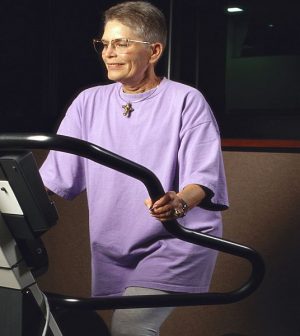- Could Your Grocery Store Meat Be Causing Recurring UTIs?
- Are You Making This Expensive Thermostat Error This Winter?
- Recognizing the Signs of Hypothyroidism
- 10 Strategies to Overcome Insomnia
- Could Artificial Sweeteners Be Aging the Brain Faster?
- Techniques for Soothing Your Nervous System
- Does the Water in Your House Smell Funny? Here’s Why
- Can a Daily Dose of Apple Cider Vinegar Actually Aid Weight Loss?
- 6 Health Beverages That Can Actually Spike Your Blood Sugar
- Treatment Options for Social Anxiety Disorder
An Exercise Game Plan for Boomers

If you’re a member of the baby boom generation, don’t think you’re too old to exercise.
On the contrary, it’s especially important for you to stay active, and even more so if you have a condition that threatens mobility, such as osteoarthritis or rheumatoid arthritis.
Exercise can give you more energy, help prevent chronic illnesses and keep you independent longer, according to the U.S. National Institute on Aging.
For most adults, moderate exercise, including brisk walking, is safe and easy. You don’t need special equipment — just supportive shoes — and you can walk almost anywhere. But talk to your doctor before you start, especially if you have any medical concerns or haven’t exercised in a long time.
It’s fine to begin slowly. If you want to start with walking, do it at a leisurely pace for 10 minutes at a time. As you build up your endurance, add more time and increase your speed. A good goal is to walk briskly for at least a half hour on most days of the week.
Add strength, flexibility and balance exercises into your routine. Balance exercises, like tai chi, can help prevent falls, a leading cause of injuries and hospitalizations for older people. Research shows that learning fall prevention exercises can help protect you from injury if you do happen to take a tumble.
To stay safe — and to avoid discomfort — don’t do vigorous exercise right after a big meal. Also, avoid working out in very hot or cold weather.
Stop if you feel pain in your chest, or become dizzy or extremely short of breath. Otherwise, keep moving.
Exercise can keep you looking and feeling good as you blow out more candles on your birthday cake.
More information
The U.S. National Institute on Aging has detailed information on every type of exercise and how to make the most of each one.
Source: HealthDay
Copyright © 2026 HealthDay. All rights reserved.










